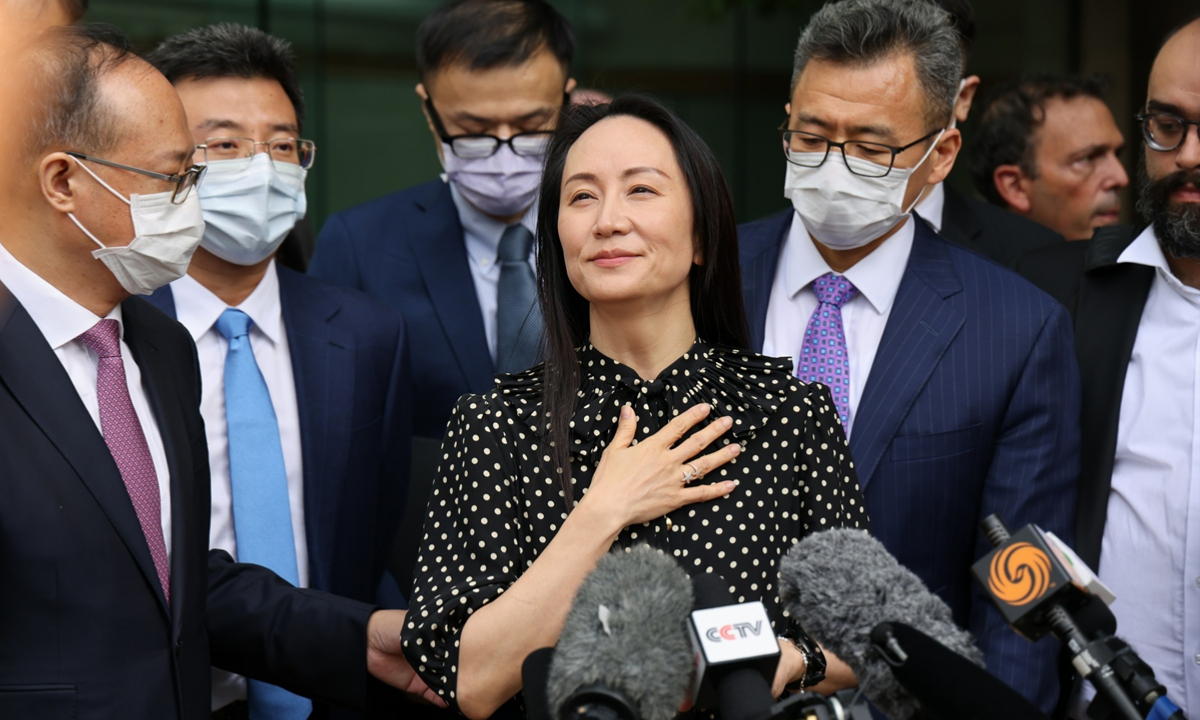
Meng Wanzhou speaks to media outside the British Columbia Supreme Court in Canada. Photo: cnsphoto
A few days ago, a US court announced the dismissal of all charges against Meng Wanzhou, chief financial officer of Chinese telecom giant Huawei Technologies. So far, this act of hostage and coercive diplomacy jointly carried out by the US and Canada has been completely morally bankrupt . Meng's acquittal and her safe return to China is a victory for China's diplomacy, for the Chinese people and for forces of international justice against hegemonism and power politics. The case of Meng is undoubtedly a landmark event in the international political field, for the world has once again seen the hypocrisy of the US and the despicable behaviour of Canada's complicity.
The cloak of law cannot conceal the political plot of the US to suppress and contain China. The US Department of Justice asked Canada to arrest and extradite Meng on charges of bank fraud for allegedly misleading the bank HSBC to continue providing services to Huawei. With the continuous disclosure of relevant evidence, the means and context of how the US fabricated Meng's case have become clear: From the malicious use of HSBC and piecing together charges, to the deliberate tampering of the so-called key evidence - a PPT document obtained by HSBC executives after their meeting with Meng in 2013. What is more blatant is that shortly after this case, the then US president Donald Trump publicly stated, "I will certainly intervene (in Meng's case) when necessary if it is beneficial to reach the largest (US-China) trade agreement in history."
Renowned economist Jeffrey Sachs pointed out that the Meng's case is part of the US economic war against China based on commercial and geopolitical considerations, and has nothing to do with the so-called maintenance of international rule of law. The Canadian judge hearing the extradition of Meng also raised questions, calling the US charges against Meng "unclear" and "unusual."
Even HSBC, which the US refers to as a "fraud victim," has stood up to support Meng, disclosing materials related to the US allegations. These new evidences clearly show that Meng did not make "false statements" to HSBC, and also revealed that the extradition evidence submitted by the US side had serious inaccuracies, with important information deliberately omitted to mislead the Canadian court.
History strikes a similar tone. Any company that causes the US to feel "capability panic" will receive "special attention," such as Toshiba of Japan, Alstom of France and Siemens of Germany. Meng's experience is very similar to that of Alstom's senior executive Pierucci which is another "American trap." Although the trap was covered with a legal disguise, the naked weaponization of American hegemony and usurpation behind it has long been exposed.
The pretext of the rule of law cannot cover up for Canada's despicable acts of being an accomplice. The rule of law should be to pursue fairness and justice, not condone evil or even act in collusion. Both the Canadian Extradition Act and the Canada-US Extradition Treaty clearly stipulate that extradition for political purposes is not supported. The Canadian authorities have long argued that they were merely fulfilling their obligations under the bilateral extradition treaty with no political intent, but this is not the case. The Canadian government has long assessed the case and is fully aware of its political nature. The Canadian Security Intelligence Service recognized that the arrest was "highly political" and would "cause global shock waves."In fact, there are not a few countries that have signed extradition treaties with the US. According to reports, the US also asked European and Asian countries to arrest and extradite Meng, but only Canada took over the "dirty work."
The Canadian authorities have been willing, sometimes even more eager than the US,to be a cat's paw. On December 1, 2018, after Meng arrived in Vancouver, the Royal Canadian Mounted Police did not "immediately arrest" Meng according to the arrest warrant issued by the court. Instead, Meng was illegally searched and interrogated for three hours in the name of immigration inspection without informing her of their real intentions. During the Canadian court trial, the authorities participated in the arrest gave inconsistent and contradictory testimonies, suggesting that the Canadian law enforcement agencies' arrest of Meng was "very dirty." On the issue of disclosing relevant information, the Canadian authorities have always been secretive and they even obstructed the court in every possible way from accepting Meng's new evidence from HSBC.
The continued push for American hegemony is doomed to be unpopular, and those who are accomplices to it will inevitably reap the consequences. The case of Meng reminds us once again that the international community should stand united, resolutely oppose all forms of hegemonism and power politics, firmly resist all kinds of illegal unilateral sanctions, long-arm jurisdiction, and political framing, jointly uphold international fairness and justice, and defend basic norms governing international relations.
The author is an observer on on international affairs. opinion@globaltimes.com.cn



